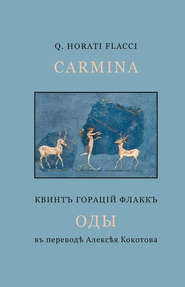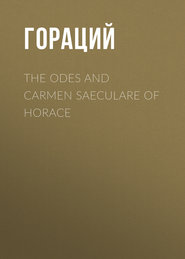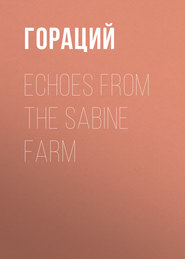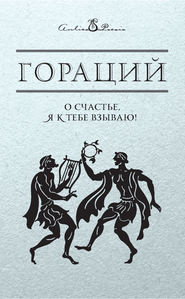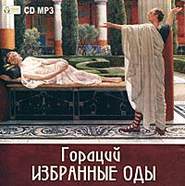По всем вопросам обращайтесь на: info@litportal.ru
(©) 2003-2024.
✖
The Works of Horace
Настройки чтения
Размер шрифта
Высота строк
Поля
How far Codrus, who was not afraid to die for his country, is removed from Inachus, and the race of Aeacus, and the battles also that were fought at sacred Troy—[these subjects] you descant upon; but at what price we may purchase a hogshead of Chian; who shall warm the water [for bathing]; who finds a house: and at what hour I am to get rid of these Pelignian colds, you are silent. Give me, boy, [a bumper] for the new moon in an instant, give me one for midnight, and one for Murena the augur. Let our goblets be mixed up with three or nine cups, according to every one's disposition. The enraptured bard, who delights in the odd-numbered muses, shall call for brimmers thrice three. Each of the Graces, in conjunction with the naked sisters, fearful of broils, prohibits upward of three. It is my pleasure to rave; why cease the breathings of the Phrygian flute? Why is the pipe hung up with the silent lyre? I hate your niggardly handfuls: strew roses freely. Let the envious Lycus hear the jovial noise; and let our fair neighbor, ill-suited to the old Lycus, [hear it.] The ripe Rhode aims at thee, Telephus, smart with thy bushy locks; at thee, bright as the clear evening star; the love of my Glycera slowly consumes me.
ODE XX.
TO PYRRHUS.
Do you not perceive, O Pyrrhus, at what hazard yon are taking away the whelps from a Gutulian lioness? In a little while you, a timorous ravisher, shall fly from the severe engagement, when she shall march through the opposing band of youths, re-demanding her beauteous Nearchus; a grand contest, whether a greater share of booty shall fall to thee or to her! In the mean time, while you produce your swift arrows, she whets her terrific teeth; while the umpire of the combat is reported to have placed the palm under his naked foot, and refreshed his shoulder, overspread with his perfumed locks, with the gentle breeze: just such another was Nireus, or he that was ravished from the watery Ida.
ODE XXI.
TO HIS JAR.
O thou goodly cask, that wast brought to light at the same time with me in the consulship of Manlius, whether thou containest the occasion of complaint, or jest, or broils and maddening amours, or gentle sleep; under whatever title thou preservest the choice Massic, worthy to be removed on an auspicious day; descend, Corvinus bids me draw the mellowest wine. He, though he is imbued in the Socratic lectures, will not morosely reject thee. The virtue even of old Cato is recorded to have been frequently warmed with wine. Thou appliest a gentle violence to that disposition, which is in general of the rougher cast: Thou revealest the cares and secret designs of the wise, by the assistance of merry Bacchus. You restore hope and spirit to anxious minds, and give horns to the poor man, who after [tasting] you neither dreads the diadems of enraged monarchs, nor the weapons of the soldiers. Thee Bacchus, and Venus, if she comes in good-humor, and the Graces loth to dissolve the knot [of their union], and living lights shall prolong, till returning Phoebus puts the stars to flight.
ODE XXII.
TO DIANA.
O virgin, protectress of the mountains and the groves, thou three-formed goddess, who thrice invoked, hearest young women in labor, and savest them from death; sacred to thee be this pine that overshadows my villa, which I, at the completion of every year, joyful will present with the blood of a boar-pig, just meditating his oblique attack.
ODE XXIII.
TO PHIDYLE.
My rustic Phidyle, if you raise your suppliant hands to heaven at the new moon, and appease the household gods with frankincense, and this year's fruits, and a ravening swine; the fertile vine shall neither feel the pestilential south-west, nor the corn the barren blight, or your dear brood the sickly season in the fruit-bearing autumn. For the destined victim, which is pastured in the snowy Algidus among the oaks and holm trees, or thrives in the Albanian meadows, with its throat shall stain the axes of the priests. It is not required of you, who are crowning our little gods with rosemary and the brittle myrtle, to propitiate them with a great slaughter of sheep. If an innocent hand touches a clear, a magnificent victim does not pacify the offended Penates more acceptably, than a consecrated cake and crackling salt.
ODE XXIV.
TO THE COVETOUS.
Though, more wealthy than the unrifled treasures of the Arabians and rich India, you should possess yourself by your edifices of the whole Tyrrhenian and Apulian seas; yet, if cruel fate fixes its adamantine grapples upon the topmost roofs, you shall not disengage your mind from dread, nor your life from the snares of death. The Scythians that dwell in the plains, whose carts, according to their custom, draw their vagrant habitations, live in a better manner; and [so do] the rough Getae, whose uncircumscribed acres produce fruits and corn free to all, nor is a longer than annual tillage agreeable, and a successor leaves him who has accomplished his labor by an equal right. There the guiltless wife spares her motherless step-children, nor does the portioned spouse govern her husband, nor put any confidence in a sleek adulterer. Their dower is the high virtue of their parents, and a chastity reserved from any other man by a steadfast security; and it, is forbidden to sin, or the reward is death. O if there be any one willing to remove our impious slaughters, and civil rage; if he be desirous to be written FATHER OF THE STATE, on statues [erected to him], let him dare to curb insuperable licentiousness, and be eminent to posterity; since we (O injustice!) detest virtue while living, but invidiously seek for her after she is taken out of our view. To what purpose are our woeful complaints, if sin is not cut off with punishment? Of what efficacy are empty laws, without morals; if neither that part of the world which is shut in by fervent heats, nor that side which borders upon Boreas, and snows hardened upon the ground, keep off the merchant; [and] the expert sailors get the better of the horrible seas? Poverty, a great reproach, impels us both to do and to suffer any thing, and deserts the path of difficult virtue. Let us, then, cast our gems and precious stones and useless gold, the cause of extreme evil, either into the Capitol, whither the acclamations and crowd of applauding [citizens] call us, or into the adjoining ocean. If we are truly penitent for our enormities, the very elements of depraved lust are to be erased, and the minds of too soft a mold should be formed by severer studies. The noble youth knows not how to keep his seat on horseback and is afraid to go a hunting, more skilled to play (if you choose it) with the Grecian trochus, or dice, prohibited by law; while the father's perjured faith can deceive his partner and friend, and he hastens to get money for an unworthy heir. In a word, iniquitous wealth increases, yet something is ever wanting to the incomplete fortune.
ODE XXV.
TO BACCHUS.
A DITHYRAMBIC.
Whither, O Bacchus, art thou hurrying me, replete with your influence? Into what groves, into what recesses am I driven, actuated with uncommon spirit? In what caverns, meditating the immortal honor of illustrious Caesar, shall I be heard enrolling him among the stars and the council of Jove? I will utter something extraordinary, new, hitherto unsung by any other voice. Thus the sleepless Bacchanal is struck with enthusiasm, casting her eyes upon Hebrus, and Thrace bleached with snow, and Rhodope traversed by the feet of barbarians. How am I delighted in my rambles, to admire the rocks and the desert grove! O lord of the Naiads and the Bacchanalian women, who are able with their hands to overthrow lofty ash-trees; nothing little, nothing low, nothing mortal will I sing. Charming is the hazard, O Bacchus, to accompany the god, who binds his temples with the verdant vine-leaf.
ODE XXVI.
TO VENUS.
I lately lived a proper person for girls, and campaigned it not without honor; but now this wall, which guards the left side of [the statue] of sea-born Venus, shall have my arms and my lyre discharged from warfare. Here, here, deposit the shining flambeaux, and the wrenching irons, and the bows, that threatened the resisting doors. O thou goddess, who possessest the blissful Cyprus, and Memphis free from Sithonian snow, O queen, give the haughty Chloe one cut with your high-raised lash.
ODE XXVII.
TO GALATEA, UPON HER GOING TO SEA.
Let the omen of the noisy screech-owl and a pregnant bitch, or a tawny wolf running down from the Lanuvian fields, or a fox with whelp conduct the impious [on their way]; may the serpent also break their undertaken journey, if, like an arrow athwart the road, it has frightened the horses. What shall I, a provident augur, fear? I will invoke from the east, with my prayers, the raven forboding by his croaking, before the bird which presages impending showers, revisits the stagnant pools. Mayest thou be happy, O Galatea, wheresoever thou choosest to reside, and live mindful of me and neither the unlucky pye nor the vagrant crow forbids your going on. But you see, with what an uproar the prone Orion hastens on: I know what the dark bay of the Adriatic is, and in what manner Iapyx, [seemingly] serene, is guilty. Let the wives and children of our enemies feel the blind tumults of the rising south, and the roaring of the blackened sea, and the shores trembling with its lash. Thus too Europa trusted her fair side to the deceitful bull, and bold as she was, turned pale at the sea abounding with monsters, and the cheat now become manifest. She, who lately in the meadows was busied about flowers, and a composer of the chaplet meet for nymphs, saw nothing in the dusky night put stars and water. Who as soon as she arrived at Crete, powerful with its hundred cities, cried out, overcome with rage, "O father, name abandoned by thy daughter! O my duty! Whence, whither am I come? One death is too little for virgins' crime. Am I awake, while I deplore my base offense; or does some vain phantom, which, escaping from the ivory gate, brings on a dream, impose upon me, still free from guilt. Was it better to travel over the tedious waves, or to gather the fresh flowers? If any one now would deliver up to me in my anger this infamous bull, I would do my utmost to tear him to pieces with steel, and break off the horns of the monster, lately so much beloved. Abandoned I have left my father's house, abandoned I procrastinate my doom. O if any of the gods hear this, I wish I may wander naked among lions: before foul decay seizes my comely cheeks, and moisture leaves this tender prey, I desire, in all my beauty, to be the food of tigers." "Base Europa," thy absent father urges, "why do you hesitate to die? you may strangle your neck suspended from this ash, with your girdle that has commodiously attended you. Or if a precipice, and the rocks that are edged with death, please you, come on, commit yourself to the rapid storm; unless you, that are of blood-royal, had rather card your mistress's wool, and be given up as a concubine to some barbarian dame." As she complained, the treacherously-smiling Venus, and her son, with his bow relaxed, drew near. Presently, when she had sufficiently rallied her, "Refrain (she cried) from your rage and passionate chidings, since this detested bull shall surrender his horns to be torn in pieces by you. Are you ignorant, that you are the wife of the invincible Jove? Cease your sobbing; learn duly to support your distinguished good fortune. A division of the world shall bear your name."
ODE XXVIII.
TO LYDE.
What can I do better on the festal day of Neptune? Quickly produce, Lyde, the hoarded Caecuban, and make an attack upon wisdom, ever on her guard. You perceive the noontide is on its decline; and yet, as if the fleeting day stood still, you delay to bring out of the store-house the loitering cask, [that bears its date] from the consul Bibulus. We will sing by turns, Neptune, and the green locks of the Nereids; you, shall chant, on your wreathed lyre, Latona and the darts of the nimble Cynthia; at the conclusion of your song, she also [shall be celebrated], who with her yoked swans visits Gnidos, and the shining Cyclades, and Paphos: the night also shall be celebrated in a suitable lay.
ODE XXIX.
TO MAECENAS.
O Maecenas, thou progeny of Tuscan kings, there has been a long while for you in my house some mellow wine in an unbroached hogshead, with rose-flowers and expressed essence for your hair. Disengage yourself from anything that may retard you, nor contemplate the ever marshy Tibur, and the sloping fields of Aesula, and the hills of Telegonus the parricide. Leave abundance, which is the source of daintiness, and yon pile of buildings approaching near the lofty clouds: cease to admire the smoke, and opulence, and noise of flourishing Rome. A change is frequently agreeable to the rich, and a cleanly meal in the little cottage of the poor has smoothed an anxious brow without carpets or purple. Now the bright father of Andromeda displays his hidden fire; now Procyon rages, and the constellation of the ravening Lion, as the sun brings round the thirsty season. Now the weary shepherd with his languid flock seeks the shade, and the river, and the thickets of rough Sylvanus; and the silent bank is free from the wandering winds. You regard what constitution may suit the state, and are in an anxious dread for Rome, what preparations the Seres and the Bactrians subject to Cyrus, and the factious Tanais are making. A wise deity shrouds in obscure darkness the events of the time to come, and smiles if a mortal is solicitous beyond the law of nature. Be mindful to manage duly that which is present. What remains goes on in the manner of the river, at one time calmly gliding in the middle of its channel to the Tuscan Sea, at another, rolling along corroded stones, and stumps of trees, forced away, and cattle, and houses, not without the noise of mountains and neighboring woods, when the merciless deluge enrages the peaceful waters. That man is master of himself and shall live happy, who has it in his power to say, "I have lived to-day: to-morrow let the Sire invest the heaven, either with a black cloud, or with clear sunshine; nevertheless, he shall not render ineffectual what is past, nor undo or annihilate what the fleeting hour has once carried off. Fortune, happy in the execution of her cruel office, and persisting to play her insolent game, changes uncertain honors, indulgent now to me, by and by to another. I praise her, while she abides by me. If she moves her fleet wings, I resign what she has bestowed, and wrap myself up in my virtue, and court honest poverty without a portion. It is no business of mine, if the mast groan with the African storms, to have recourse to piteous prayers, and to make a bargain with my vows, that my Cyprian and Syrian merchandize may not add to the wealth of the insatiable sea. Then the gale and the twin Pollux will carry me safe in the protection of a skiff with two oars, through the tumultuous Aegean Sea."
Другие электронные книги автора Квинт Гораций Флакк
Другие аудиокниги автора Квинт Гораций Флакк
Избранные оды




 4.67
4.67






